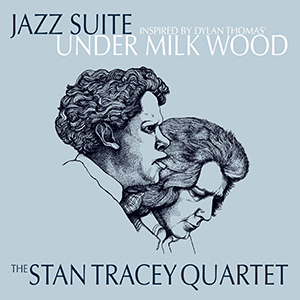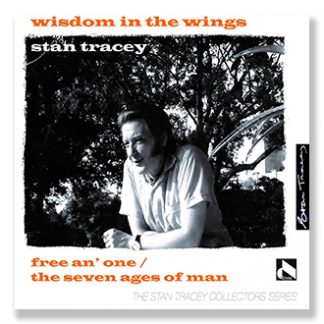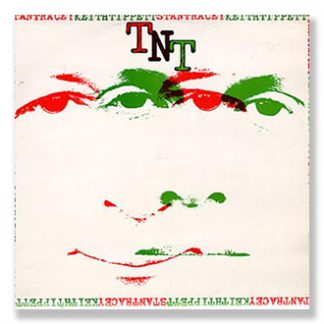Description
If you are a British jazz fan of a certain age, it is highly likely that you will have already purchased this recording. Recorded in 1965 and first released in 1966, this album was quickly recognised as an iconic landmark in British jazz. It received more publicity than any album before it and the critics as one were of the opinion that the UK had finally made a record of truly international standing.
With the advent of a music industry more interested in selling units than quality, despite the staggering reception it received and countless awards bestowed, it was not long before it was deleted from the catalogue and remained in the Columbia Records vault until its tenth anniversary when Stan and his wife, Jackie, like so many other musicians at that period, formed their own independent label – Steam Records – in 1976. Under Milk Wood, or rather “Jazz Suite inspired by Under Milk Wood” to give it the full original title, was naturally to be their first release, back then still on vinyl.
It won further awards throughout the industry, this time for Best Reissue and the album enjoyed another wave of success. When Steam Records expired around 1989, CDs had just arrived and other labels had their turn at reissuing the masterpiece: Blue Note International, Jazzizit & Trio Records all kept the music alive and on the shelves. I began Resteamed Records in the late 2000s to document Stan’s recorded works, past, present & future, so of course the first release was this one. It was my intention to keep it in print for all generations to experience the music created in 1965 and, as a result, it has been reissued on Resteamed several times since.
This release, however, is the first time since 1976 that it can be heard on vinyl. I need hardly stress how popular vinyls have become again in recent years – the sound quality has always been special compared to digital versions.
I will let the music speak for itself. Much has already been penned over the years, I’m sure a short book could house the dozens of adulating reviews it has procured. But I did want to make particular mention of the musicians. Stan, as many people are aware, was resident pianist at Ronnie Scott’s Club in its heyday in the 1960s and it was after hours that he wrote the material we find on this album. He had already struck up a strong musical partnership with Bobby Wellins on tenor saxophone since 1959 at the Flamingo Club in London and it’s important to establish here once and for all that Stan always maintained the success of the album was due to Bobby’s interpretation of the music, coupled with his unique sound. Young Jeff Clyne on bass became a much loved musician and tutor in later years and regularly worked with Stan in the 1960s, while Jackie Dougan, who was Stan’s preferred small group drummer, emigrated to Australia soon after this recording but tragically died in a road accident.
This was a pivotal moment in British jazz when first released and I feel certain this latest format will be welcomed by another new generation of listeners, while others will be reminded of this epic moment in our jazz history and hopefully listen with the pride that I feel whenever I’ve played it.
Clark Tracey 2023
Personnel:
- Bobby Wellins – Saxophone
- Stan Tracey – Piano
- Jeff Clyne – Bass
- Jackie Dougan – Drums
Tracks:
- Cockle Row (06:50)
- Starless And Bible Black (03:45)
- I Lost My Step in Nantucket (03.45)
- No Good Boyo (05:00)
- Penpals (03.45)
- Llaregub (04:50)
- Under Milk Wood (05.55)
- A.M. Mayhem (06:50)
Recorded March, 1965
Reviews:
“”It is now 19 years since Stan Tracey first introduced his jazz suite Under Milk Wood. The record was an instant, if modest, success and one of the pieces on it, the haunting Starless and Bible Black remains probably the finest single recorded performance by a British jazz group. With the plaintive sound of Bobby Wellins tenor saxophone floating above the subdued piano chords, it evokes to perfection the atmosphere of a soft spring night… it was one of the most enjoyable concerts I have attended for ages… everyone writes suites these days… but none of them has lasted like this one…””
Dave Gelly
The Observer
“Stan himself is, quite literally, brilliant. His compositions all have that classic modern jazz feel: the heads are glaringly apparent and the solos obviously placed, but that’s what modern jazz should be about. Tracey has always been a progressive pianist with his self-created bounds and the rest of his band seem to share that ideology. Jazz for jazz lovers.”
Rhythm Magazine
“Stan Tracey’s 1965 recording of his “Jazz Suite inspired by Dylan Thomas” has attained the status of a classic disc – and rightly so. After more than 40 years, the album stands up as one of Stan’s finest. A British jazz masterpiece? How often can you suggest such a thing? But in this case the answer is undoubtedly “Yes””
Tony Augarde
Music Web International



